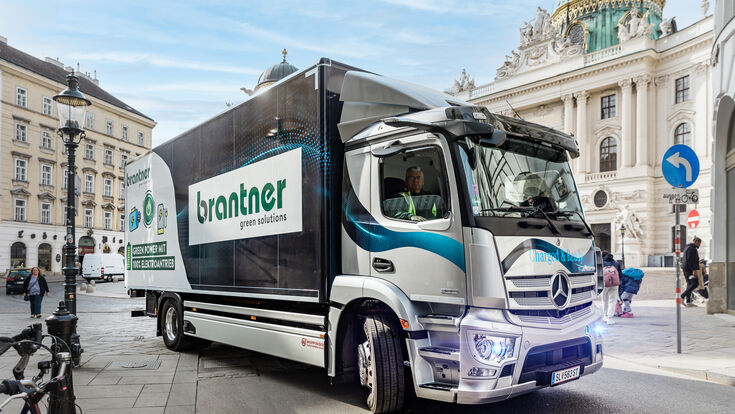e-Mobility : Brantner sees potential in electric trucks

The Austrian waste disposal service provider Brantner used the all-electric Mercedes-Benz eActros for a fortnight for emission-free waste disposal at system catering businesses in Vienna. Recently, the company presented the results of this practical test. The question was whether an electric series vehicle can be used in everyday operations. The answer is clear: "The eActros has now proven for a fortnight that it is easily able to cope with a complete collection day including intensive lifting operations - thanks to its range of up to 300 kilometres without any intermediate charging. In the case of our pioneering project, the energy for the journeys comes from hydropower and thus from a sustainable source," explains Eva Koller, Managing Director for Operations and Sales at Brantner.
Inside the e-truck, the waste - as recently seen in the example of the system catering company VAPIANO - already packaged and pre-sorted into organic waste, plastic and paper is loaded as general cargo. Prepared according to the standards of the waste collection and recycling system GUT, the freight can be accommodated in a space- and energy-saving way.
High efficiency in city traffic
Especially in stop-and-go traffic, the electric drive scores with its high efficiency. The design of the drive train also contributes to this: The motor is not located at the front under the cab, but on the rear axle. This means that there is no need for a cardan shaft for power transmission, which avoids friction losses. Through energy recovery downhill and during braking, the range of 300 kilometres can also be achieved or even exceeded in practice. This is sufficient for waste disposal tours in urban areas. To compensate for the additional dead weight of the battery, the e-truck is allowed to weigh one tonne more in total: The two-axle truck is approved for a maximum permissible total weight of 19 tonnes.
Latest safety technology
During the presentation, it also became clear where the challenges for truck drivers in the city lie: cyclists and pedestrians criss-cross and cross. Not everyone is aware of the limitations in the field of vision of a driver of heavy vehicles. To ensure that the driver maintains an overview even in unclear situations, the eActros is equipped with the latest safety technology from Mercedes. For example, electronic exterior mirror cameras reliably map a wide environment next to the truck in the cabin. A turn-off assistant additionally warns of vehicles, cyclists and pedestrians in the so-called "blind spot" on the right-hand side. And the latest generation of Emergency Brake Assist can also independently initiate emergency braking for pedestrians - still a unique Mercedes-Benz feature.
E-mobility has potential in the waste management industry
The truck's electric drive produces fewer direct emissions. This reduces air pollution in the area where it is used: the vehicle does not emit any nitrogen oxides (NOx), and particulate matter is only produced by tyre and brake abrasion. The high efficiency of the drive combined with energy recovery during braking also reduces energy consumption, especially in urban traffic. If the e-truck is operated with sustainably generated electricity, this also contributes to a reduction in overall emissions. Ultimately, this also protects the climate.
The waste management industry in particular seems predestined to play a pioneering role in the e-mobility of heavy commercial vehicles: The mileage is manageable, the vehicles usually complete tours of around 300 kilometres in urban use. This means that in many cases the daily tasks can even be accomplished without intermediate charging. In addition, the trucks regularly return to base, where they can be recharged at the company's own premises. Brantner estimates that the complete conversion of Austrian waste management companies could save 215,000 tonnes of CO2 annually.
Brantner itself initially plans to purchase ten electric trucks within the next two years. This corresponds to only about one per cent of the vehicles in the company's own fleet. In the long term, however, the company wants to push e-mobility.
"There is no way around non-fossil fuel propulsion in the coming decades," affirms Josef Scheidl, Managing Director of the Brantner Environment Group and Brantner Austria. "At the corporate level, however, the topic must be viewed holistically and therefore the economic side must also be taken into account. The conversion of the vehicle fleet is currently still associated with very high acquisition costs. Appropriate incentives would facilitate and accelerate the changeover, especially for medium-sized companies," says Scheidl.
There is also further potential for more sustainability in the waste management sector through the use of sustainable packaging and reusable containers. In this area, Brantner is a long-standing system partner of GUT Gastro Umwelt Technik - an environmental and management consultancy as well as a commercial waste collection and recycling system for packaging approved by the Federal Ministry for Climate Protection with a focus on system catering.



